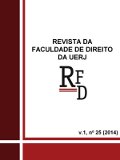POR QUE SURGEM AS REGRAS SECUNDÁRIAS? Uma reinterpretação da fábula de Hart / WHY SECONDARY RULES MIGHT EMERGE? A Reinterpretation of Hart’s Fable
DOI:
https://doi.org/10.12957/rfd.2014.11661Resumo
DOI: http://dx.doi.org/10.12957/10.12957/rfd.2014.11661
No Cap. V de O Conceito de Direito, Hart fala das regras secundárias como remédios para os defeitosde uma ordem social baseada apenas em regras primárias. O relato fixando o cenário, descrevendo os problemase indicando as soluções é aqui chamado, seguindo Gardner, a “fábula de Hart”. Quanto à natureza da fábula,MacCormick e Gardner concordam que está longe de relato histórico. MacCormick a concebe como umargumento ex post facto sobre o papel crucial que a regra de reconhecimento, das regras de alteração e dasregras de julgamento desempenham em nossos sistemas jurídicos, e Gardner, concordando com Hacker, aconcebe como uso de um método analítico-genético que analisa a natureza das regras secundárias por meio desua gênese num cenário hipotético. Meu artigo combina os insights tanto de MacCormick quanto de Gardner eHacker com a ideia de proteção do positivismo jurídico como chave para a leitura de O Conceito de Direito.Minha tese é que a fábula de Hart é um experimento mental visando mostrar não apenas a natureza das regrassecundárias, mas também os riscos de comprometer o funcionamento de tais regras ao abraçar concepçõesantipositivistas do direito.
Downloads
Publicado
Como Citar
Edição
Seção
Licença
Direitos Autorais
oArtigos publicados na Revista da Faculdade de Direito da UERJ (RFD/UERJ)
Os Direitos autorais dos artigos publicados pertencem à Revista da Faculdade de Direito da UERJ (RFD/UERJ). É permitida a reprodução total ou parcial dos artigos desde que citada a fonte.
oReprodução parcial de outras publicações
Artigos submetidos que contiverem partes de texto extraídas de outras publicações deverão obedecer aos limites especificados para garantir originalidade do trabalho submetido. Plágio em todas as suas formas constitui comportamento antiético e é inaceitável.
Recomenda-se evitar a reprodução de tabelas e ilustrações, extraídas de outras publicações. O artigo que contiver reprodução de uma ou mais tabelas e/ou ilustrações de outras publicações só será encaminhado para análise se vier acompanhado de permissão escrita do detentor do direito autoral do trabalho original para a reprodução especificada na Revista da Faculdade de Direito da UERJ (RFD/UERJ). A permissão deve ser endereçada ao autor do trabalho submetido. Em nenhuma circunstância a Revista da Faculdade de Direito da UERJ (RFD/UERJ) e os autores dos trabalhos publicados nesta revista repassarão direitos assim obtidos.
·Os trabalhos não aceitos para a publicação serão devolvidos aos autores, se solicitado.
A Revista da Faculdade de Direito está licenciada com uma Licença Creative Commons Atribuição 4.0 Internacional.
Este trabalho está licenciado sob uma Licença Creative Commons 4.0, Atribuição-Sem Derivações.
Esta licença permite copiar e redistribuir o material em qualquer suporte ou format para qualquer fim, mesmo que comercial, desde de que citada a autoria original.











